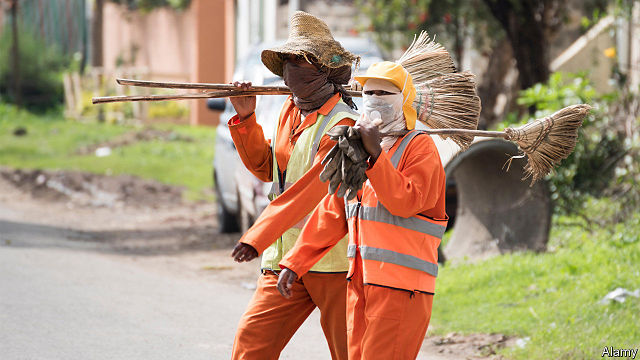 Extending the safety-net in Ethiopia: Ethiopia’s scheme to help the poor is setting an example.
Extending the safety-net in Ethiopia: Ethiopia’s scheme to help the poor is setting an example.
May 31st 2018 | ADDIS ABABA
TSIDE ZEWIDE has lived in the shadow of the national palace in Addis Ababa for more than 50 years. Since her husband died four years ago the 73-year-old has cared for three orphans, the grandchildren of her late sister, alone in a rundown government-owned shack. She has no pension and, until recently, had no income. “I relied on the kindness of my neighbours,” she sighs.
Last year Mrs Zewide’s fortunes changed. She and some 80 of her neighbours rise at dawn to sweep the streets of the Ethiopian capital for three hours a day. For this she is paid 1,200 Ethiopian birr ($44) a month, a fifth of which she is required to save. “It’s good for me psychologically,” she says. “It keeps me busy, and now at least I can tell people I have a job.” Her teammates nod in agreement.
They are participants in Ethiopia’s Urban Productive Safety Net Project, which was launched in 2017 and is among the largest social programmes in sub-Saharan Africa (outside South Africa) designed specifically for urban areas. About 400,000 poor Ethiopians in 11 cities are already enrolled. The government hopes it will eventually help 4.7m people in almost 1,000 towns. Beneficiaries are selected by a neighbourhood committee based on how poor and vulnerable they are. In addition to the paid work, they also receive training. Those who want to start their own businesses are given grants…
Ethiopia’s programme is a step towards building a national social-security system that will, in time, replace a hotch-potch of small ones. It builds on Ethiopia’s flagship rural safety-net, which is the largest of its kind on the continent and covers some 10m poor people in the countryside (out of a total population of about 102m). The government has committed $150m to fund the new scheme and the World Bank has stumped up the remaining $300m needed for the first five years. Ethiopia hopes that within ten years it will no longer need help financing the programme.
—
Join the conversation on Twitter and Facebook.

























